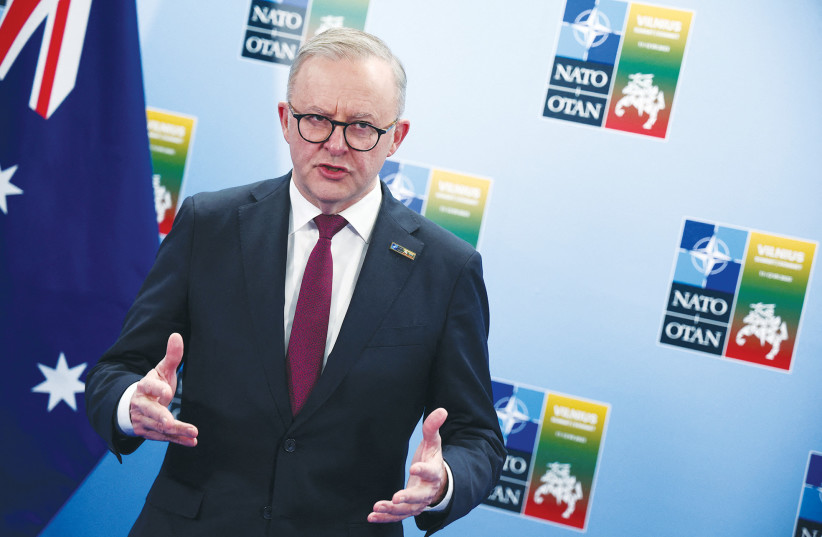As reported by The Jerusalem Post’s Lahav Harkov, as of August 8, Australia’s Labor government has now determined that it will refer to the West Bank, east Jerusalem, and the Gaza Strip as “occupied Palestinian territories,” and all settlements there as illegal. The foreign minister, Senator Penny Wong, and other Labor members, are claiming this is a return to the practices of past governments.
However, it is actually much more significant than that. It also appears at least in part the result of internal party politics.
It is true that past Australian governments and ministers have referred to settlements as illegal, and have casually referred to “the Palestinian territories” as a type of shorthand for these areas, while referring to them as “occupied.” But this is the first time any Australian government has made a conscious determination that they should be labeled “occupied Palestinian territories,” and no previous Australian government or minister has made a habit of calling them by that name.
The government argues this change brings us into line with a number of Australia’s allies, such as the EU, UK, and New Zealand – but historically, Australia’s relationship with Israel has almost always been closer and more supportive than any of those actors, no matter who was in power.
The new announcement is just the latest in a number of steps this government has taken to distance itself from Israel since its election in May last year.

How Australia has tried to distance itself from Israel
It has changed Australia’s vote on several anti-Israel UN motions in a way that is less favorable to Israel. While it continues to oppose the UN taking Israel to the International Criminal Court, and to make statements opposing the UN’s discrimination against Israel, it has also refused to sign up to US-led joint statements on these matters.
Then there was the reversal of the previous Australian government’s recognition of west Jerusalem as Israel’s capital, unfortunately, announced on Simhat Torah last year. The rationale for this decision was that the status of Jerusalem is a final status issue to be negotiated by the parties – even though no one doubts west Jerusalem will remain as part of Israel in any final status resolution.
This makes the latest decision all the more baffling. By labeling all of these areas “occupied Palestinian territories,” the Australian government has now apparently predetermined something that is very much at the crux of any final status resolution – final borders. The government seems unconcerned about this manifest inconsistency.
Nor does it seem concerned about the offense to the Jewish community in Australia in claiming Judaism’s holiest sites, such as the Western Wall and Temple Mount, are in “occupied Palestinian territory” – or the sheer illogic of describing the Gaza Strip that way 18 years after Israel withdrew completely from there.
THIS IS THE first Australian government in nearly 50 years that has been dominated by the left wing of the Australian Labor party. While it has generally striven, with overall success, to present itself as centrist and responsible, the party’s Left does expect some wins from its new control over the party.
Two of the main causes of the left-wing, judging by motions that have come up at the party’s various state conferences, have been questioning Australia’s AUKUS nuclear-powered submarine deal with the US and UK, and the Israeli-Palestinian conflict, also a preoccupation for some on the Right, particularly in Australia’s largest state New South Wales.
The government continues to support the AUKUS deal negotiated by the previous Liberal government. Labor’s National Conference, which occurs every three years, will be held from August 17 to 19. The government seems determined to avoid any controversies at the conference, especially regarding AUKUS. For several months, there had been speculation that it might do a trade-off with the Left’s power brokers to give further ground on Israel in exchange for consensus on AUKUS, or even just for quiet on the Israeli-Palestinian issue.
Now it appears the government has preempted the conference with this latest decision. Of course, it remains to be seen whether this will hold off the Left and their allies from further hostile moves regarding Israel. Many are likely to now argue that, given the government has – in their view correctly – identified the proper legal status of the land and settlements, recognizing “Palestine” as a state would be the obvious moral next step.
When the Jerusalem decision was announced last year, the Israeli government’s reaction was appropriately strong. This time, however, while the Australian Jewish community has been overwhelmingly vocal in its disapproval, little has been reported from official Israeli sources.
The Palestinian Authority, on the other hand, reacted quickly, with Australian newspapers reporting on August 10 that the Palestinian Authority’s Foreign Ministry had released a statement welcoming this “significant and important development” and calling on the Australian government to now “recognize the State of Palestine without delay or hesitation” thus reflecting “the position of the Labor party and its members.”
Accordingly, we sincerely hope Israel’s government is seriously considering making public its undoubted reservations regarding Australia’s actions, aiming to discourage the Australian government from taking further counter-productive steps, such as recognizing “Palestine.”
The writer is a senior policy analyst at the Australia/Israel & Jewish Affairs Council (AIJAC).
